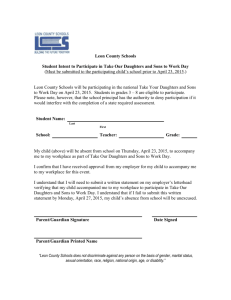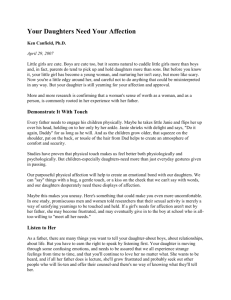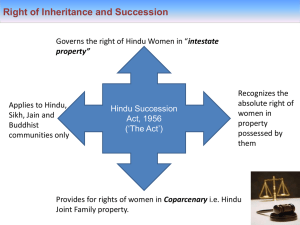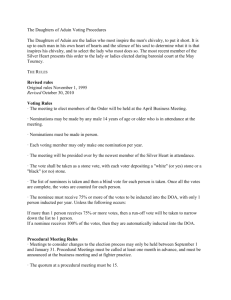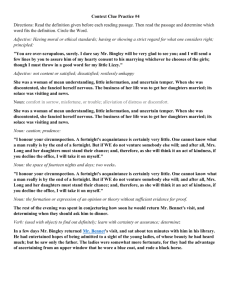Tamar Altman
advertisement
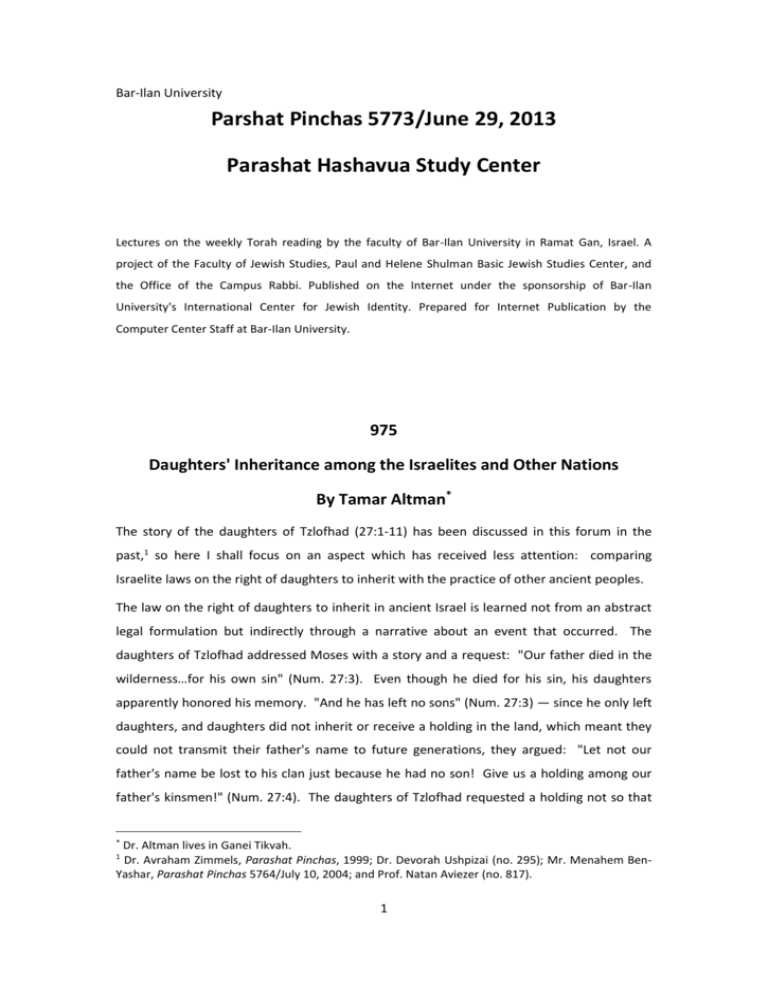
Bar-Ilan University Parshat Pinchas 5773/June 29, 2013 Parashat Hashavua Study Center Lectures on the weekly Torah reading by the faculty of Bar-Ilan University in Ramat Gan, Israel. A project of the Faculty of Jewish Studies, Paul and Helene Shulman Basic Jewish Studies Center, and the Office of the Campus Rabbi. Published on the Internet under the sponsorship of Bar-Ilan University's International Center for Jewish Identity. Prepared for Internet Publication by the Computer Center Staff at Bar-Ilan University. 975 Daughters' Inheritance among the Israelites and Other Nations By Tamar Altman* The story of the daughters of Tzlofhad (27:1-11) has been discussed in this forum in the past,1 so here I shall focus on an aspect which has received less attention: comparing Israelite laws on the right of daughters to inherit with the practice of other ancient peoples. The law on the right of daughters to inherit in ancient Israel is learned not from an abstract legal formulation but indirectly through a narrative about an event that occurred. The daughters of Tzlofhad addressed Moses with a story and a request: "Our father died in the wilderness…for his own sin" (Num. 27:3). Even though he died for his sin, his daughters apparently honored his memory. "And he has left no sons" (Num. 27:3) — since he only left daughters, and daughters did not inherit or receive a holding in the land, which meant they could not transmit their father's name to future generations, they argued: "Let not our father's name be lost to his clan just because he had no son! Give us a holding among our father's kinsmen!" (Num. 27:4). The daughters of Tzlofhad requested a holding not so that * Dr. Altman lives in Ganei Tikvah. Dr. Avraham Zimmels, Parashat Pinchas, 1999; Dr. Devorah Ushpizai (no. 295); Mr. Menahem BenYashar, Parashat Pinchas 5764/July 10, 2004; and Prof. Natan Aviezer (no. 817). 1 1 they could be landowners, but in order to perpetuate the name of their father on the holding that they might receive. It seems quite brazen to request that the laws of inheritance be changed because of personal circumstances. But since it was a matter of receiving a holding in the land, establishing a household and preserving the family's name, the daughters of Tzlofhad did not think their request was out of place. Their weak legal status impelled them to seek a way to overcome a law that was likely to wipe out their father's name and memory. They considered their words carefully, phrasing their petition so as not sound insolent and presenting their plight in a manner that would obtain them a favorable result: 1. "They stood before Moses" (Num. 27:2)—the Hebrew expression va-ta`amodna lifne indicates subservience and accepting another person's rule, expressing their willingness to accept any ruling that might be handed down on their case. 2. Accepting judgment as just: by saying that their father "died for his own sin" (Num. 27:3) they showed that they were true to the faith, the tradition, and the authority of the community's leadership. 3. To be sure their request would not sound like rebellion, they stressed that he "was not one of the faction, Korah's faction, which banded together against the Lord" (ibid.). 4. They submitted their petition prior to entering the land, thereby showing their faith in the Lord's promise that He would give His people the land of Israel. 5. They addressed their request to "Moses, Eleazar the Priest, the chieftains, and the whole assembly" (Num. 27:2), the most distinguished forum in terms of their importance and numbers. Such an appeal attests to rare and exceptional courage. Although they were the daughters of a father who had died for his sin, Moses did not reject them out of hand; rather, he listened patiently to their request. This is an example of the liberality of Jewish law: anyone may demand justice (cf. the two prostitutes in Solomon's trial, I Kings, ch. 3). "Moses brought their case before the Lord" (Num. 27:5), and the Lord's response was: "The plea of Tzlofhad's daughters is just" (Num. 27:7), on which Rashi comments: "They pled well…Fortunate is the person with whose words the Almighty concurs."2 The Lord, acknowledging the justice of their petition, commanded Moses, "you should give them a hereditary holding" (Num. 27:7), and established a new law for all time: "If a man dies 2 Also cf. Sifre Numbers, 134. 2 without leaving a son, you shall transfer his property to his daughter" (Num. 27:8). In the absence of a male heir, the females inherit (Rashi on 27:7). Their success stemmed from acting as one and cooperating with each other: Scripture says "va-tikravna" (in the singular), indicating that they acted together (similarly to Ruth and Naomi, another example of women who succeeded due to their joint action). In the wake of the reservations brought up by representatives of the tribe of Menasheh— that the daughters of Tzlofhad would marry into other tribes and thus part of the tribal inheritance would pass into the hands of their husbands' tribes (Num. 36:1-4)—Moses completed the ruling at the Lord's bidding: "No inheritance of the Israelites may pass over from one tribe to another, but the Israelites must remain bound each to the ancestral portion of his tribe. Every daughter among the Israelite tribes who inherits a share must marry someone from a clan of her father's tribe, in order that every Israelite may keep his ancestral share" (Num. 36:7-8). From this case we see that the laws of inheritance by sons and daughters stem from the laws of apportioning holdings in the land. The Torah hardly deals with laws of inheritance that are not connected to the issue of apportioning ancestral holdings, but the Mishnah and the Gemara supplement this legislation. This leads us to the question of the differences between Jewish law and the laws in ancient Near-Eastern law codices and legal documents.3 Although there are indications that women inherited or owned land in southern Mesopotamia in the second half of the third millienium B.C.E., if the deceased had sons, the daughters generally did not inherit. The earliest clear indication of the rights of a daughter to inherit from her father—only when the deceased left no male heir—comes from a royal inscription (in Sumerian) of Gudea, king of Lagash, dating to the late 22nd century B.C.E.: "In a household that has no male child, the daughter becomes its heir (of the household)."4 This legal tradition continued, and the code of LipitIshtar, king of Isin (Sumerian, circa 1930 B.C.E.) states unequivocally: "If a man dies without 3 My husband Amnon assisted me in reviewing the ancient Near-eastern sources. For an up-to-date edition of legal codices, see Martha T. Roth, Law Collections from Mesopotamia and Asia Minor, with a contribution by Harry A. Hoffner, Jr., edited by Piotr Michalowski (Society of Biblical Literature, Writing from the Ancient World, 6), Atlanta, Georgia 1995. On the rules of inheritance in general and of daughters in particular, as reflected by legal documents, see the relevant chapters in Raymond Westbrook (ed.), A History of Ancient Near Eastern Law, Vols. I-II, Leiden and Boston 2003, Vol. I, pp. 163-165, 206, 397-399, 458, 507, 601, 679-680, 699-700, 712, 730; for sources on the practice in Egypt, see Vol. I, pp. 126, 333-336; Vol. II, pp. 803-804. For a discussion of this subject also see Tzippora ben Barak, Yerushat ha-Banot be-Yisrael u-va-Mizrah ha-Kadum, Jerusalem 2004. 4 Gudea Statue B, vii, 44-46. For the inscription, cf. Dietz Otto Edzard, Gudea and his Dynasty [The Royal Inscriptions of Mesopotamia, Early Periods Vol. 3/1], Toronto 1997, p. 36. 3 leaving a male heir, (his) unmarried daughter shall be his heir."5 Likewise, "If in the lifetime of the father his daughter become ugbabtu, nadītu, or qadištu, then they (her brothers) shall divide the estate, treating her as an equal heir (to them)."6 We find a different practice in southern Mesopotamia in the first half of the second millennium, B.C.E., in the wake of massive migration of West Semitic speaking peoples to the area. Instead of giving daughters a portion of their father's inheritance, daughters customarily received a dowry from their father upon their marriage, to which was often added a gift from their husband. The father of the bride could set aside a portion for his daughter well in advance of his daughter's marriage, to be treated as a fund kept for her until such time as she wed. Upon her marriage, when she moved to her husband's house, the husband would receive this dowry in trust, and upon his death it reverted to his widow. Evidence from the Middle Babylonian Period (16th-11th centuries, B.C.E.) shows cases where daughters received part of their father's inheritance, either as a dowry or as regular inheritance. Documents from the Assyrian merchant colony at Kaneš (Anatolia, 1950-1840 B.C.E.) attest to the practice of daughters sharing in their father's inheritance along with their brothers. Also Middle Assyrian documents indicate instances where daughters inherited on an equal basis with their brothers. The Nuzi practice (Middle Euphrates, 14501340 B.C.E.) allowed daughters to be included alongside sons in dividing the inheritance, although the portion they received was smaller. In the absence of sons to inherit from the father, a daughter alone could inherit all her father's property. We have information in this regard from northern Syria (From Alalakh, Stratum VII, 17th cent. B.C.E.), indicating that daughters had the right to inherit just as sons. This practice continued later, as well, as is documented in sources from Stratum IV (15 th cent. B.C.E.). Ugarit sources (13-14th cent. B.C.E.) are less clear on the question of daughters inheriting, but we can conclude from them that in the absence of male heirs a daughter could inherit, and in any event the dowry that she received from her father upon her marriage was reserved for her, including the daughter's portion in the estate of her father's house. In Emar (13th cent. B.C.E.) dowries were comprised of furniture, housewares, and jewelry (i.e., moveable goods) and maid-servants who were given to the daughter upon her 5 Roth, p. 27, par. (b). The next paragraph (c) came down to us extremely fragmented, but from what has been preserved we understand it to have stipulated that in the event a man die without leaving a male heir, and his daughter is married, then the family holding apparently would go to the younger sister. 6 Ibid., p. 30, par. 22. The categories mentioned here refer to three classes of priestess or devotee who are forbidden to marry. 4 marriage, but they could also include land. When specified in a testament, daughters could inherit the same as sons. When there was no male heir, sometimes the testator would go beyond simply willing his inheritance to his daughter, also conferring on her the status of "son" so that she could carry out the ancestral rites—a function that devolved on the oldest son. In Egypt, in the time of the Old Kingdom and the First Intermediate Period (2675-1980 B.C.E.), daughters could inherit part of the property of their deceased father, but their brothers would receive larger portions that theirs. Several findings from the time of the New Kingdom (1539-1000 B.C.E.) attest to daughters inheriting along with their brothers, and there is also evidence of daughters inheriting in the Third Intermediate Period (1000-650 B.C.E.). The general rule seems to be that the peoples of the ancient Near East not only recognized the right of daughters to inherit from their fathers in the event that he had no male heirs, but in certain places also recognized the right of daughters to inherit even when there were male heirs. The basic difference between these practices and biblical law was that the Israelites put the emphasis on maintaining the hereditary holding of the tribe, lest the daughters marry into other tribes and their property holdings pass with them to a different tribe. The cases mentioned above deal with urban societies that were guided by their apprehension lest the family's inheritance pass into the hands of a different family. Nevertheless, they recognized the need of a daughter to be able to sustain herself - be she a daughter whose father had died before she was married or a married daughter whose husband had died. The practice of including in the dowry landed property, which was entrusted to the daughter's husband and would revert to her either upon his death or upon her divorce, was designed to assure that in any event daughters could support themselves by leasing their fields and receiving a fraction of the produce. Nevertheless, there was still reluctance (evident in several places) to grant daughters who inherited land the freedom to bequeath their property to whomever they wished upon their death; this was to assure that the family holding or a part of it not pass to another family. To this end, certain societies placed advance restrictions on daughters' freedom of choice in willing their property. Be that as it may, there is no indication of such apprehensions in Scripture. Thus we see the societal context in which the laws granting daughters the right to inherit emerged: a patriarchal tribal society where solidarity within the tribe still reigned, prior to the growth of 5 family competition for survival as the tribal framework began to disintegrate in the period of the Judges and the early days of the Monarchy.7 Translated by Rachel Rowen 7 According to the Book of Job, Job bequeathed his daughters an inheritance alongside their brothers, but we must ask to what extent we are entitled to ascribe this to a late Israelite practice. According to documents that have come down to us from the Jews of Yev, it appears that there, too, daughters enjoyed equal rights under the laws of inheritance, but perhaps this was influenced by the current practice in Egypt. See Yaron, Ha-Mishpat shel Mismekhei Yev, Jerusalem 1961, p. 84; Samuel Loewenstamm, "Yerushah," Encylopedia Mikra'it 3 (1958), columns 788-791, and loc. cit., p. 791. 6


